- Home
- Frank Herbert
The Collected Stories of Frank Herbert Page 2
The Collected Stories of Frank Herbert Read online
Page 2
Thus, “Committee” represents that form of science fiction which attempts to depict a deeper reality: Future History. It says in a story, which the reader can accept because it’s “only a story,” that the essence of this fiction will come to pass. You as reader put the connections to reality together only after the reading.
This leads by what is to me an orderly thought process into the concept of the operating manual, the handbook for whatever you do as work. This is the book which gives you the myth of the orderly world, hiding all of the hangups and misalignments behind illusionary rules. Often such manuals are written by committees. (You may recall that a camel is a horse created by a committee.) My favorite of such handbooks is the Blue Jackets Manual which is issued to incoming recruits of the US Navy. The BJM has many classic lines, including this one:
“It is absolutely imperative that the ship be kept watertight.”
Nobody can doubt this, especially if his life depends on it. Between the book and the execution of the obvious, however, is a world of creative originality. Here’s where we really operate by the book. It’s this in-between world which inspired me to write a short story about the educated ignorance to be found in a handbook of the future, calling the story, of course, “By the Book.” The story says that those precise and orderly barriers we raise against omnipresent outer chaos can be useful tools or they can be traps. It all depends on how you interpret your manual. This is usually what I tell people who come to me asking for “rules about writing.”
Such a handbook is possible, of course, and many have been written. Mine might begin this way:
Rule One: Work to develop an almost organic link between your primary tool and yourself.
Rule Two: Your primary tool is language, written, spoken, however it communicates.
Rule Three: Write regularly; don’t wait for a call from your favorite muse.
Rule Four: Be sensitive to and responsive to your audience, but not slavish.
And so on …
I mean that about an organic linkage most profoundly, understanding that you are connected to language by devices; in my case, a typewriter. This linkage is unique to the individual and, in a sense, it dissolves as you use it. You have to develop your linkage anew each time.
So much for rule books.
Which brings us to “The Primitives.”
The author’s name originally was to have been Noah Arkwright. That’s the pseudonym chosen by Jack Vance, Poul Anderson and myself when we plotted the story while building a houseboat which we used on the waters of the Sacramento–San Joaquin delta at the head of San Francisco Bay. We intended to write the story together as a lark, but the pressure of work forced Vance and Anderson out of the picture and they insisted I finish it. I developed our plot into the novelette.
To me this story has a lovely logic. After all, what would a primitive make out of a diamond? See if you disagree.
“The Primitives” also represented my attempt to open up another possibility for the role of women in our past. In my view humankind was matriarchal for far more centuries than it was patriarchal. Male dominance probably came onto the scene rather late after an earlier animal history of pack relationships probably similar to those of the higher apes, and then a long period of female dominance after we became self-conscious.
The picture of the female cowering in the cave with her brood while the male fought off the sabertooth tiger has always struck me as a bit much. I find it easier to see the image of the domineering Cave Mother, keeper of the birth mystery and the sacred vessel of ongoing life. If there’s one thing primitives do not like, that’s to bring down the wrath of powerful spirits.
Perhaps we haven’t changed much in that respect, which is another recurring theme of science fiction: It may look new, but it’s really the same old thing.
“The Heaven Makers” plays with zen consciousness / taoist eternity translated for Western awareness. Words are finite creatures, however, and the universe (even the universe of your own book) changes as you touch it. There exists in this book a recognition of our concensus choice to use a linear rather than a non-linear model for our universe. But what do we do when we find that this linearity closes its own circle? Do the endless serial events merely repeat? These are some of the underlying conceptualizations of “The Heaven Makers.” We think our ancestral gods no longer awaken mysteries in our minds. We have the myth of the endless personal story, denying the visions of the older mysteries in the hope of finding new scientific answers. Thus we deify science and its offspring, technology. Science fiction has become a special toy to those alerted to this spectrum. It unfolds the monsters of awareness which lurk in our mutually-created vision of eternity. We know there are things in this eternity which we don’t want to see, but like children peering past the protective legs of an adult, we seek a safe glimpse of the monster.
“The Heaven Makers” assumes that the immortal have no morality which can be equated with a finite morality. Look around you. The morality of the species overrides the puny morality of the individual. Our creation of law may have been the attempt to match species’ morality with that of the individual. And, of course, the species may not be immortal.
In a natural progression from “The Heaven Makers,” and all the stories before it, you get “The Being Machine” (“Mind Bomb”). This is in part another story of outside manipulation of the individual, playing with the concept of what we mean by “free will.” It is the influence of reason in rebellion against any manipulation, even by itself. It is the paradox of manipulation in an equalizing (entropic) universe. This is law and order at the end of its tether, the species projected into a far-far future where manipulation of the individual has been carried to a self-defeating extreme. It says law and order lead inevitably to chaos.
Another paradox?
“Seed Stock” takes up that recurrent science fiction theme of humans colonizing/populating another planet (the eternity myth for the species). This story, however, says specifically that these colonizing humans must become transformed into children of that planet, even to the point of rejecting Mother Earth. By inference, it speaks to the eternity myth right here on this planet, saying that humans, to make their myth a reality, must become children of this planet once more and children of any planet.
That, essentially, represents the motif of hope behind most science fiction: the fact that we write about any future at all, even an interesting one, assumes that future will come to pass. We balance on Occam’s razor, our assumptions on one side, our myths on the other, and sometimes we cannot tell the two apart. In common with other art forms, science fiction strives to translate our old dreams into new ones and, in the process, to make the nightmares less fearsome.
Frank Herbert
Port Townsend, Washington
29 April 1973
LOOKING FOR SOMETHING?
Mirsar Wees, chief indoctrinator for Sol III sub-prefecture, was defying the intent of the Relaxation-room in his quarters. He buzzed furiously back and forth from metal wall to metal wall, his pedal-membrane making a cricket-like sound as the vacuum cups disengaged.
“The fools!” he thought. “The stupid, incompetent, mindless fools!”
Mirsar Wees was a Denebian. His race had originated more than three million earth years ago on the fourth planet circling the star Deneb—a planet no longer existing. His profile was curiously similar to that of a tall woman in a floor-length dress, with the vacuum-cup pedal-membrance contacting the floor under the “skirt.” His eight specialized extensors waved now in a typical Denebian rage-pattern. His mouth, a thin transverse slit entirely separate from the olfactory-lung orifice directly below it, spewed forth a multi-lingual stream of invective against the assistant who cowered before him.
“How did this happen?” he shouted. “I take my first vacation in one hundred years and come back to find my career almost shattered by your incompetency!”
Mirsar Wees turned and buzzed back across the room. Through his vi
sion-ring, an organ somewhat like a glittering white tricycle-tire jammed down about one-third of the distance over his head, he examined again the report on Earthling Paul Marcus and maintained a baleful stare upon his assistant behind him. Activating the vision cells at his left, he examined the wall chronometer.
“So little time,” he muttered. “If only I had someone at Central Processing who could see a deviant when it comes by! Now I’ll have to take care of this bumble myself, before it gets out of hand. If they hear of it back at the bureau…”
Mirsar Wees, the Denebian, a cog in the galaxy-wide korad-farming empire of his race, pivoted on his pedal-membrane and went out a door which opened soundlessly before him. The humans who saw his flame-like profile this night would keep alive the folk tales of ghosts, djinn, little people, fairies, elves, pixies …
Were they given the vision to see it, they would know also that an angry overseer had passed. But they would not see this, of course. That was part of Mirsar Wees’ job.
* * *
It was mainly because Paul Marcus was a professional hypnotist that he obtained an aborted glimpse of the rulers of the world.
The night it happened he was inducing a post-hypnotic command into the mind of an audience-participant to his show on the stage of the Roxy Theater in Tacoma, Washington.
Paul was a tall, thin man with a wide head which appeared large because of this feature although it really was not. He wore a black tailcoat and formal trousers, jewelled cuff links and chalkwhite cuffs, which gleamed and flashed as he gestured. A red spotlight in the balcony gave a Mephisto cast to his stage-setting, which was dominated by a backdrop of satin black against which gleamed two giant, luminous eyes. He was billed as “Marcus the Mystic” and he looked the part.
The subject was a blonde girl whom Paul had chosen because she displayed signs of a higher than ordinary intelligence, a general characteristic of persons who are easily hypnotized. The woman had a good figure and showed sufficient leg when she sat down on the chair to excite whistles and cat-calls from the front rows. She flushed, but maintained her composure.
“What is your name, please?” Paul asked.
She answered in a contralto voice, “Madelyne Walker.”
“Miss or Mrs.?”
She said, “Miss.”
Paul held up his right hand. From it dangled a gold chain on the end of which was a large paste gem with many facets cut into its surface. A spotlight in the wings was so directed that it reflected countless star-bursts from the gem.
“If you will look at the diamond,” Paul said. “Just keep your eyes on it.”
He began to swing the gem rhythmically, like a pendulum, from side to side. The girl’s eyes followed it. Paul waited until her eyes were moving in rhythm with the swinging bauble before he began to recite in a slow monotone, timed to the pendulum:
“Sleep. You will fall asleep … deep sleep … deep sleep … asleep … deep asleep … asleep … asleep…”
Her eyes followed the gem.
“Your eyelids will become heavy,” Paul said. “Sleep. Go to sleep. You are falling asleep … deep, restful sleep … healing sleep … deep asleep … asleep … asleep … asleep…”
Her head began to nod, eyelids to close and pop open, slower and slower. Paul gently moved his left hand up to the chain. In the same monotone he said, “When the diamond stops swinging you will fall into a deep, restful sleep from which only I can awaken you.” He allowed the gem to swing slower and slower in shorter and shorter sweeps. Finally, he put both palms against the chain and rotated it. The bauble at the end of the chain began to whirl rapidly, its facets coruscating with the reflections of the spotlight.
Miss Walker’s head fell forward and Paul kept her from falling off the chair by grasping her shoulder. She was in deep trance. He began demonstrating to the audience the classic symptoms which accompany this—insensitivity to pain, body rigidity, complete obedience to the hypnotist’s voice.
The show went along in routine fashion. Miss Walker barked like a dog. She became the dowager queen with dignified mien. She refused to answer to her own name. She conducted the imaginary symphony orchestra. She sang an operatic aria.
The audience applauded at the correct places in the performance. Paul bowed. He had his subject deliver a wooden bow, too. He wound up to the finale.
“When I snap my fingers you will awaken,” he said. “You will feel completely refreshed as though after a sound sleep. Ten seconds after you awaken you will imagine yourself on a crowded streetcar where no one will give you a seat. You will be extremely tired. Finally, you will ask the fat man opposite you to give you his seat. He will do so and you will sit down. Do you understand?”
Miss Walker nodded her head.
“You will remember nothing of this when you awaken,” Paul said.
He raised his hand to snap his fingers …
It was then that Paul Marcus received his mind-jarring idea. He held his hand up, fingers ready to snap, thinking about this idea, until he heard the audience stirring restlessly behind him. Then he shook his head and snapped his fingers.
Miss Walker awakened slowly, looked around, got up, and exactly ten seconds later began the streetcar hallucinations. She performed exactly as commanded, again awakened, and descended confusedly from the stage to more applause and whistles.
It should have been gratifying. But from the moment he received the idea, the performance could have involved someone other than Paul Marcus for all of the attention he gave it. Habit carried him through the closing routine, the brief comments on the powers of hypnotism, the curtain calls. Then he walked back to his dressing room slowly, preoccupied, unbuttoning his studs on the way as he always did following the last performance of the night. The concrete cave below stage echoed to his footsteps.
In the dressing room he removed the tailcoat and hung it in the wardrobe. Then he sat down before the dressing table mirror and began to cream his face preparatory to removing the light makeup he wore. He found it hard to meet his own eyes in the mirror.
“This is silly,” he told himself sourly.
A knock sounded at the door. Without turning, he said, “Come in.”
The door opened hesitantly and the blonde Miss Walker stepped into the room.
“Excuse me,” she said. “The man at the door said you were in here and…”
Seeing her in the mirror, Paul turned around and stood up.
“Is something wrong?” he asked.
Miss Walker looked around her as though to make sure they were alone before she answered.
“Not exactly,” she said.
Paul gestured to a settee beside his dressing table. “Sit down, won’t you?” he asked. He returned to the dressing table as Miss Walker seated herself.
“You’ll excuse me if I go on with this chore,” he said, taking a tissue to the grease paint under his chin.
Miss Walker smiled. “You remind me of a woman at her nightly beauty care,” she said.
Paul thought: Another stage-struck miss, and the performance gives her the excuse to take up my time. He glanced at the girl out of the corners of his eyes. “Not bad, though…”
“You haven’t told me to what I owe the pleasure of your company,” he said.
Miss Walker’s face clouded with thought.
“It’s really very silly,” she said.
Probably, Paul thought.
“Not at all,” he said. “Tell me what’s on your mind.”
“Well, it’s an idea I had while my friends were telling me what I did on the stage,” she said. She grinned wryly. “I had the hardest time believing that there actually wasn’t a streetcar up there. I’m still not absolutely convinced. Maybe you brought in a dummy streetcar with a lot of actors. Oh, I don’t know!” She shook her head and put a hand to her eyes.
The way she said, “I don’t know!” reminded Paul of his own idea; the idea. He decided to give Miss Walker the fast brush-off in order to devote more time to thinking this new
idea through to some logical conclusion.
“What about the streetcar?” he asked.
The girl’s face assumed a worried expression. “I thought I was on a real streetcar,” she said. “There was no audience, no … hypnotist. Nothing. Just the reality of riding the streetcar and being tired like you are after a hard day’s work. I saw the people on the car. I smelled them. I felt the car under my feet. I heard the money bounce in the coin-catcher and all the other noises one hears on a streetcar—people talking, a man opening his newspaper. I saw the fat man sitting there in front of me. I asked him for his seat. I even felt embarrassed. I heard him answer and I sat down in his seat. It was warm and I felt the people pressing against me on both sides. It was very real.”
“And what bothers you?” Paul asked.
She looked up from her hands which were tightly clasped in her lap.
“That bothers me,” she said. “That streetcar. It was real. It was as real as anything I’ve ever known. It was as real as now. I believed in it. Now I’m told it wasn’t real.” Again she looked down at her hands. “What am I to believe?”
This is getting close to the idea, Paul thought.
“Can you express what bothers you in any other way?” he asked.
She looked him squarely in the eyes. “Yes,” she said. “I got to thinking while my friends were talking to me. I got to wondering. What if all this—” she gestured around her—“our whole lives, our world, everything we see, feel, hear, smell, or sense in any way is more of the same. A hypnotic delusion!”

 Direct Descent
Direct Descent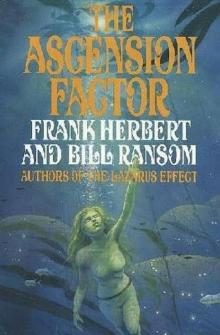 The Ascension Factor
The Ascension Factor The Heaven Makers
The Heaven Makers Children of Dune
Children of Dune Old Rambling House
Old Rambling House Dune
Dune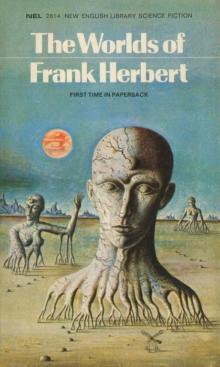 The Worlds of Frank Herbert
The Worlds of Frank Herbert The Jesus Incident
The Jesus Incident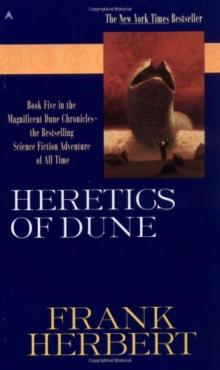 Heretics of Dune
Heretics of Dune Whipping Star
Whipping Star Dune Messiah
Dune Messiah Man of Two Worlds
Man of Two Worlds The Book of Frank Herbert
The Book of Frank Herbert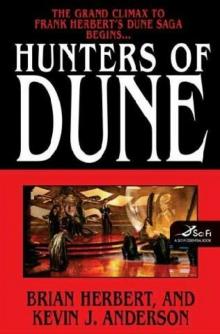 Hunters Of Dune
Hunters Of Dune The Tactful Saboteur
The Tactful Saboteur Soul Catcher
Soul Catcher God Emperor of Dune
God Emperor of Dune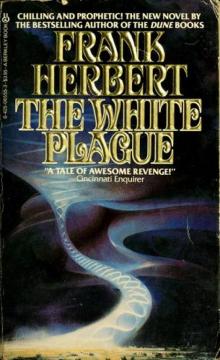 The White Plague
The White Plague The Green Brain
The Green Brain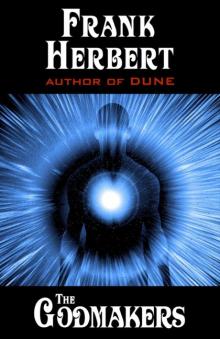 The Godmakers
The Godmakers Sandworms of Dune
Sandworms of Dune Destination Void
Destination Void The Dosadi Experiment
The Dosadi Experiment Eye
Eye High-Opp
High-Opp The Eyes of Heisenberg
The Eyes of Heisenberg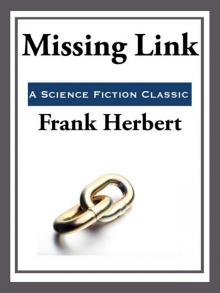 Missing Link
Missing Link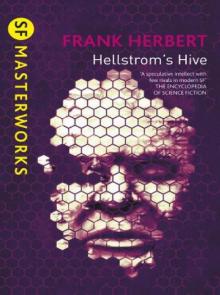 Hellstrom's Hive
Hellstrom's Hive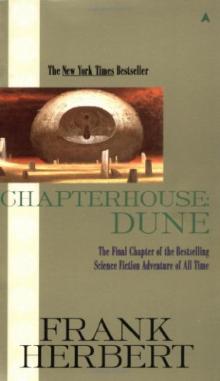 Chapterhouse: Dune
Chapterhouse: Dune The Santaroga Barrier
The Santaroga Barrier The Dragon in the Sea
The Dragon in the Sea Operation Haystack
Operation Haystack A Thorn in the Bush
A Thorn in the Bush Four Unpublished Novels
Four Unpublished Novels Dune dc-1
Dune dc-1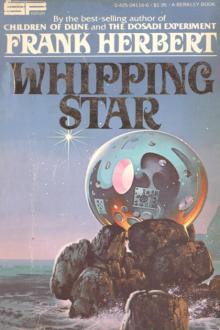 Jorj X. McKie 1 - Whipping Star
Jorj X. McKie 1 - Whipping Star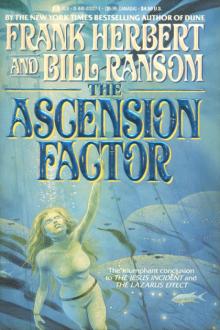 DV 4 - The Ascension Factor
DV 4 - The Ascension Factor Frank Herbert - Dune Book 4 - God Emperor Of Dune
Frank Herbert - Dune Book 4 - God Emperor Of Dune ChapterHouse: Dune dc-6
ChapterHouse: Dune dc-6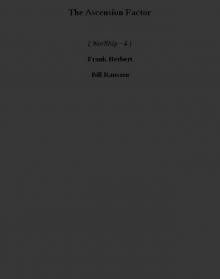 The Ascension Factor w-4
The Ascension Factor w-4 A Game of Authors
A Game of Authors Children of Dune dc-3
Children of Dune dc-3 Destination: Void: Prequel to the Pandora Sequence
Destination: Void: Prequel to the Pandora Sequence The Collected Stories of Frank Herbert
The Collected Stories of Frank Herbert Dune Messiah dc-2
Dune Messiah dc-2 Frank Herbert - Dune Book 5 - Heretics of Dune
Frank Herbert - Dune Book 5 - Heretics of Dune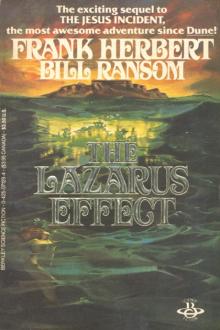 DV 3 - The Lazarus Effect
DV 3 - The Lazarus Effect The Jesus Incident w-2
The Jesus Incident w-2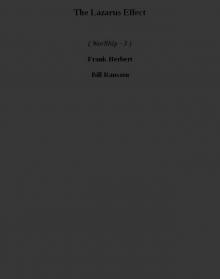 The Lazarus Effect w-3
The Lazarus Effect w-3 Frank Herbert
Frank Herbert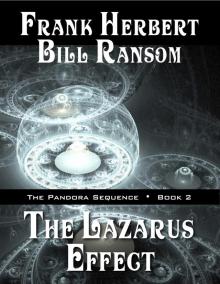 The Ascension Factor: Pandora Sequence
The Ascension Factor: Pandora Sequence Dune (40th Anniversary Edition)
Dune (40th Anniversary Edition)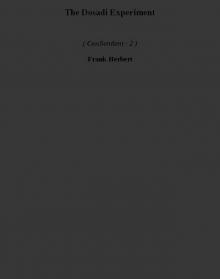 The Dosadi Experiment c-2
The Dosadi Experiment c-2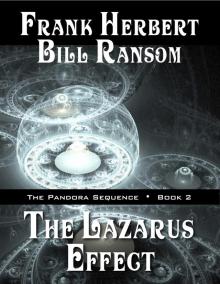 The Lazarus Effect
The Lazarus Effect God Emperor of Dune dc-4
God Emperor of Dune dc-4 The Pandora Sequence: The Jesus Incident, the Lazarus Effect, the Ascension Factor
The Pandora Sequence: The Jesus Incident, the Lazarus Effect, the Ascension Factor The Green Brain (v4.0)
The Green Brain (v4.0) The Heaven Makers (v4.0)
The Heaven Makers (v4.0) Heretics of Dune dc-5
Heretics of Dune dc-5